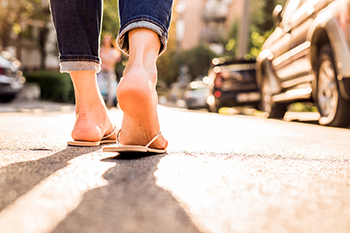
Wearing flip-flops leaves your feet vulnerable to various infections, from bacteria to viruses. When your feet are exposed in public places, harmful organisms, such as staphylococcus, can cling to them. This bacterium can cause skin irritation, and in extreme cases, serious foot conditions may emerge. The risk increases if you have open sores or even small wounds from recent pedicures. Another concern is athlete's foot, which is a contagious fungal infection that causes itching. Walking with minimal footwear increases the chances of encountering and contracting this fungus. You also risk exposure to the virus responsible for warts, which is HPV, while wearing flip-flops. If you enjoy wearing flip-flops, it is suggested that you make an appointment with a podiatrist to discuss similarly easy and comfortable footwear alternatives that are healthier for your feet.
Flip-flops can cause a lot of problems for your feet. If you have any concerns about your feet or ankles, contact one of our podiatrists from Pennsylvania. Our doctors will assist you with all of your foot and ankle needs.
Flip-Flops and Feet
Flip-flops have managed to become a summer essential for a lot of people. While the shoes may be stylish and easy to slip on and off, they can be dangerous to those who wear them too often. These shoes might protect you from fungal infections such as athlete’s foot, but they can also give you foot pain and sprained ankles if you trip while wearing them.
When Are They Okay to Wear?
Flip-flops should only be worn for very short periods of time. They can help protect your feet in places that are crawling with fungi, such as gym locker rooms. Athlete’s foot and plantar warts are two common fungi that flip-flops may help protect your feet against.
Why Are They Bad for My Feet?
These shoes do not offer any arch support, so they are not ideal for everyday use. They also do not provide shock absorption or heel cushioning which can be problematic for your feet. Additionally, you may suffer from glass cuts, puncture wounds, and stubbed toes since they offer little protection for your feet.
More Reasons Why They Are Bad for Your Feet
- They Slow You Down
- May Cause Blisters and Calluses
- Expose Your Feet to Bacteria
If you have any questions, please feel free to contact one of our offices located in Plymouth Meeting and Ambler, PA . We offer the newest diagnostic and treatment technologies for all your foot care needs.
